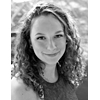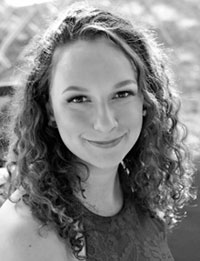AVIVA-Berlin >
Jüdisches Leben > Mia's column
AVIVA-BERLIN.de 4/18/5786 -
Beitrag vom 03.05.2020

I am not alone: finding healing in another womanôÇs story
Mia Szarvas
Something happened to me this month which changed my life: I discovered Deborah Feldman. Feldman is the author of the autobiographies "Unorthodox" and "Exodus: A Memoir", which detail her journey growing up in the Satmar Hasidic Jewish community in New York, her escape from this community, and later roots trip through Europe.
FeldmanôÇs work traces a line from her present day life in Berlin directly backwards to her familyôÇs persecution at the hands of the Nazis. While reading her work and listening to her interviews, it often felt as if Feldman was speaking directly to me, and her message was clear: you are not alone.
Deborah Feldman and I grew up in completely different worlds. Our relationship to Jewish identity is on almost opposite ends of the spectrum. She was raised in an Ultra-Orthodox Hasidic community in Brooklyn, I in a family of mixed traditions, a secular Israeli father and ex-Catholic mother cultivating my Jewish identity in the sands of the hippy West coast. Yet coming to Germany, those experiences have suddenly merged into one. We are the grandchildren of survivors, having inherited a legacy of suffering, coming to Germany to work out the trauma of the past and heal ourselves and our lineages. There is also a merging of the way we are seen - not as individuals with such distinctly different experiences and childhoods, but rather, as a part of a group, which has only one name: "Jew".
Like Feldman, I am an American Jew who uprooted my old life in the New World and set out to make a new life here in the Old World. Upon arriving in Germany, it became apparent that the word "Jew" carried a different weight. It was as if it had soaked up the vast waters of the Atlantic like a sponge during my journey across it: the letters becoming distorted, twisting and bloating to fit some ugly image crafted so long ago, inheriting a violence. My Jewish German friend described this violence in the way she once connected to her identity: "my only relationship to my Jewish heritage growing up", she explained to me, "was lighting our Shabbat candles in the window every Friday, to show those jerks that they didnôÇt win." Her Jewishness endured only in demonstration; to show that evil had not prevailed.
My own identity has become distorted by the place I am in. Losing the privilege of being seen as an individual once I identify myself as Jewish, is, as Feldman said in an interview, "the shockãÎ[of] coming from America to Europe" (DW News). It is true that, as Feldan asserted, "American Jewish people take it completely for granted that they can be who they are" (DW News). In the United States I could list off being Jewish as one of my attributes without a second thought; 5 foot 2 inches tall, brown hair, doesnôÇt like running, Jewish. It was an afterthought because I didnôÇt have to watch my reflection distort in the eyes of the listener as I named it. In Germany, as I declared myself Jewish, I watched my metamorphosis from individual to stereotype before my eyes. To expose myself to someone was to lose a part of myself; to lose my personhood, or, as Feldman says, to be "put in a drawer" (DW News).
In FeldmanôÇs memoir, Exodus, she recounts a visit to New Orleans when a stranger tells her "YouôÇve got dead people all around you... Everywhere. TheyôÇre following you. Probably your ancestors" (Feldman 103). It was in Germany that I became distinctly aware that I too was carrying the dead with me. I suppose they had always been with me, the ghosts, but they only became visible once I had returned to the land of their slaughter. I only saw the ghosts when others exposed them to me - when I told them I was Jewish. ItôÇs as if the utterance of these words was a secret spell which opened a portal to the past: the listener now saw me differently, not as myself but as part of a group, Jews, and in Germany this group is undeniably made of mostly the dead. In seeing me as one of these dead, the listener reflected this to me, and I saw myself as indivisible from my dead ancestors. In Germany, I too became a ghost. I could see the dead around me, since I was now one of them.
To expose my Jewishness in Germany is a choice I donôÇt take lightly. It comes with a deep pang of anxiety and a breath of hesitation. I know the weight of the Atlantic will come pouring down upon me each time I announce it, as if the word has been wrung out like a sponge; the connotations of that identity here in the Old World engulfing me. I know the weight each footstep carries here. One foot carries the weight of hundreds, for I, as a descendent of survivors, represent so much more than myself. I represent all those would-be grandchildren of the ones who did not survive- not only all that was lost, but all that never had the potential to be. As Feldman reflects to a friend during her first trip to Germany, "There are no Jews here...Not one. I can actually feel it, like itôÇs something in the air thatôÇs missing, a smell or a sound I usually recognizeãÎ.That scares me for some reason" (Feldman 242). I agree, the absence of that sound is deafening, terrifying, and until now, I thought I was the only one who noticed.
Often I daydream and long for simpler times - in a simpler place, back home in America, where being Jewish was as uncomplicated as being short. But I know that I, like Feldman, was drawn back to this place to work out some deep and familial trauma. Because the weight has not left this part of the world, I must be here to lighten the burden for those ghosts whose footsteps still fall with mine. I am here to heal them, and to heal myself. Perhaps each footstep in this Old World will make the next one a bit lighter. FeldmanôÇs footsteps here have lightened mine.
Sources:
DW News. "Unorthodox: Deborah FeldmanôÇs escape from Brooklyn to Berlin | DW Interview" Online video clip. YouTube. YouTube, 29 Jul. 2016. Web. 24 April 2020.
Feldman, Deborah. Exodus - a Memoir. Penguin Putnam Inc, 2015.
About: Mia Szarvas was born in Vermont to an Israeli father and Italian-American mother, raised in California, and currently lives in Bremen, Germany. Her grandmother, Marta, escaped from Poland in August of 1939 with her parents and sister, with whom she set up a new life in Palestine, while the family they left behind perished in the Holocaust. Mia has a degree in Political Ecology from the University of California, Berkeley, and works in tech to create empowerment in unexpected places. She is curious about multiculturalism, languages, feminism, and how our intertwined histories inform the present.
Follow MiaôÇs art project "Humans Who Inspire" on Instagram @humanswhoinspire. Mia draws portraits of humans who inspire her as a meditation on the multitude of incredible humans working to make the world a better place. She also accepts requests and submissions.
Read more by Mia Szarvas at AVIVA-Berlin:
"Remembering is more than the opposite of forgetting: a reflection on my personal relationship with the Holocaust by looking at the lost Jewish Life in Lvov"
"Hannukah Is"
"Mias column. The Magic of being Jewish"
"A German Christmas: Jewish Stars and almost no Jews"
"A Resolution for the New Year." Reflections on Being Jewish by Mia Szarvas
"Uncovering Jewish Venice." Reflections on Being Jewish by Mia Szarvas
"LetôÇs Get Uncomfortable ãÎ." Reflections on Being Jewish in Germany by Mia Szarvas
"I Answered All Your Question About Jews, so You DonôÇt Have To (And so I DonôÇt Have To)" - reflections by Mia Szarvas
"I DonôÇt Want Your Shame" - reflections by Mia Szarvas
Yom HaShoah - reflections by Mia Szarvas

Photo of Mia Szarvas by Elena Sloman